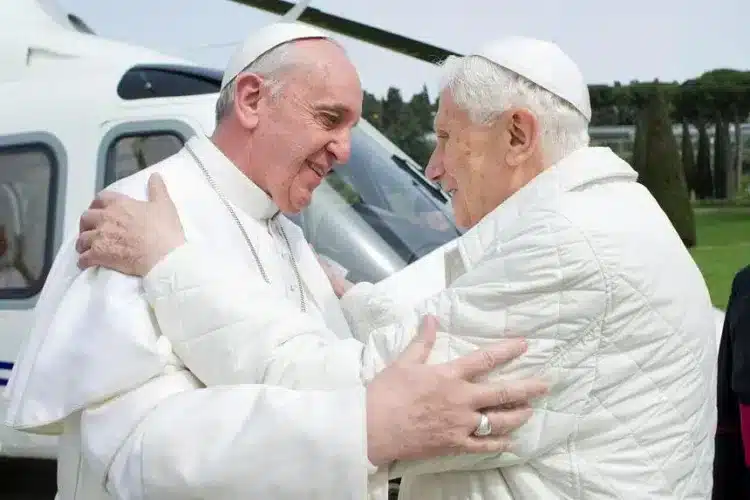Former Pope Benedict XVI dies at 95

Pope Francis (left) will be the first pope in modern history to preside over the funeral of his predecessor, Benedict XVI (right). PHOTO: REUTERS
Former Pope Benedict XVI, who died on 31 December 2022 in a monastery in the Vatican at the age of 95, asked for forgiveness for those he has “wronged” in the spiritual testament published following his death.
Pope Benedict XVI has died at the age of 95. RIP 🙏🕊 pic.twitter.com/JcalEn9Fga
— Daily Loud (@DailyLoud) December 31, 2022
Benedict, who was the first pontiff in almost 600 years to resign his position, rather than hold office for life, passed away on Saturday, according to a statement from the Vatican.
He was elected pope in April 2005, following John Paul II’s death.
About Pope Benedict XVI
Pope Benedict XVI (16 April 1927 – 31 December 2022) was the head of the Catholic Church and sovereign of the Vatican City State from 19 April 2005 to 28 February 2013. Upon his resignation, Benedict chose to be known by the title “pope emeritus,” which he retained until his death in 2022.
In Bavaria, Germany, Pope Benedict XVI was born on 16 April 1927 as Joseph Aloisius Ratzinger. In 1951, Ratzinger was ordained as a priest in his native Bavaria and became a highly regarded theologian by the late 1950s. At the age of 31, he was appointed a full professor. After a long career as a professor of theology at several German universities, he was appointed Archbishop of Munich and Freising and created a cardinal by Pope Paul VI in 1977, an unusual promotion for someone with little pastoral experience. In 1981, he was appointed Prefect of the Congregation for the Doctrine of the Faith, one of the most important dicasteries of the Roman Curia. As Dean of the College of Cardinals, he served from 2002 until he was elected pope. As one of John Paul II’s closest confidants, he had a profound influence “second to none” when it came to setting church priorities and directions prior to becoming pope.
A major focus of Pope Benedict’s papacy was the attempt to reconnect with traditional values and to bridge the divide between different faith traditions and modern culture. In addition to social justice, he focused on poverty relief initiatives, economic development in developing countries, and reconciliation between different cultures and religions. In addition to opposing same-sex marriage and abortion, he urged dialogue with other religious groups rather than excluding them. As the first pope to resign since 1415, he cited age-related health issues as the reason for his resignation.
His handling of sexual abuse cases within the Catholic Church and opposition to the usage of condoms in areas of high HIV transmission, despite their effectiveness in preventing the spread of HIV, led to substantial criticism from public health officials, anti-AIDS activists, and victim’s rights organizations.
Observer Voice is the one stop site for National, International news, Sports, Editor’s Choice, Art/culture contents, Quotes and much more. We also cover historical contents. Historical contents includes World History, Indian History, and what happened today. The website also covers Entertainment across the India and World.
Follow Us on Twitter, Instagram, Facebook, & LinkedIn

